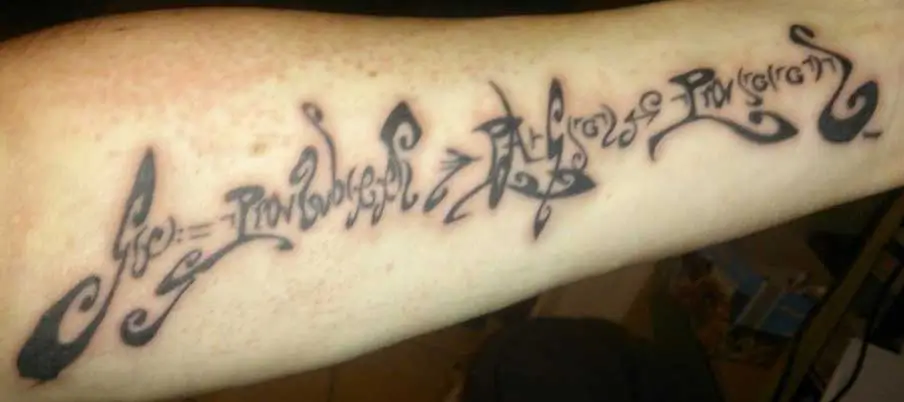Oh no ! Yet Another Flawed Incompleteness Proof
Page last updated 23 Jun 2021
From the collection of obviously flawed incompleteness proofs, here is yet another:
A Flawed Incompleteness Proof by Dennis Müller
Dennis Müller, a student in computer science, is so enamored with the notion of an incompleteness theorem that he has a statement of it tattooed on his arm, see Why I tattooed Gödel on my arm. Apparently he has done so because he believes that it has “profound philosophical implications”.

No - it is rather like having “You cannot prove this statement” tattooed on your arm. Rather than being profound, both are examples of rather childish word play based on confusion of language.
That anyone would think that a statement stating something similar is stating something profound perhaps tells you more about them than it does about real mathematics.
If you want a profound mathematical statement there are plenty available - for example, the brief but timelessly profound equation Euler’s identity:
is, unlike any incompleteness statement, the underlying foundation of much of science and technology.
Müller has written a brief “proof ” of incompleteness that results in the statement tattooed on his arm. He has written a disclaimer of his “proof ”, warning that it is “just a simplification”. While I can accept that an author might leave out details and notify the reader that one has to accept the claim that certain statements have been proved elsewhere, but regardless of whether it is a simplification, every statement that he makes must be logically valid. Otherwise what’s the point? - you might as well say, “here’s an illogical and erroneous proof that I’m showing you in the expectation that you will then believe that somewhere there is a valid error-free proof.”
Anyway, Müller proceeds to explain how Gödel numbering can be used to create a correspondence between sequences of a formal system and Gödel numbers. Then he introduces a purely number-theoretic function called
In doing so, Müller has just thrown the entire raisin d’etre of Gödel numbering out of the window - which is that Gödel numbering should provide a precise correspondence between: One sees similar fudges regarding a substitution function turning up time and time again in various attempts at incompleteness proofs, see for example Gödel’s Substitution Function, Hofstadter’s ‘Gödel, Escher, Bach’, Nagel & Newman’s Book: Gödel’s Proof.
- relationships between formal sequences and
- relationships between the corresponding Gödel numbers.
Later on, we see that what Müller actually meant was that his sub function should correspond to the substitution of the free variable of a formula
But Müller assumes that a single variable can replace the two variables
Müller finishes up with a eulogy, claiming that incompleteness proofs represent “mathematics at its absolute best ” and that “the incompleteness theorems are to logic (and logic is to math), as Heisenberg’s uncertainty principle is to quantum mechanics (and qm is to physics).”
No - it is pseudo-mathematics at its absolute worst - and attempts at incompleteness theorems are to logic as New Age mysticism is to logic - i.e: they are the antithesis of logic.
In summary, although Müller includes a disclaimer, the fact is that his ‘explanation’ doesn’t actually explain anything, instead it raises more questions than it answers.
Also see Errors in incompleteness proofs and Analysis of incompleteness proofs.
Other obviously flawed incompleteness proofs can be seen at:
- An Incompleteness Proof by Francesco Berto
- An Incompleteness Proof by Bernd Buldt
- An Incompleteness Proof by Dan Gusfield
- An Incompleteness Proof by Byunghan Kim
- An Incompleteness Proof by Sebastian Oberhoff
- An Incompleteness Proof by Arindama Singh
- An Incompleteness Proof by Jason Steinmetz
- An Incompleteness Proof by Antti Valmari


Rationale: Every logical argument must be defined in some language, and every language has limitations. Attempting to construct a logical argument while ignoring how the limitations of language might affect that argument is a bizarre approach. The correct acknowledgment of the interactions of logic and language explains almost all of the paradoxes, and resolves almost all of the contradictions, conundrums, and contentious issues in modern philosophy and mathematics.
Site Mission
Please see the menu for numerous articles of interest. Please leave a comment or send an email if you are interested in the material on this site.
Interested in supporting this site?
You can help by sharing the site with others. You can also donate at where there are full details.
where there are full details.